India retail strike draws mixed response
- Published
Indian opposition parties and trade unions have held a one-day strike against fuel price rises and plans to open the supermarket sector to foreign chains. BBC correspondents report on a mixed response around the country.
AMITABHA BHATTASALI, CALCUTTA
The strike was near-total in West Bengal. Shops across the state downed shutters and schools, colleges and private offices were closed.
There were very few vehicles on the roads of Calcutta and other cities in the state. Most private buses were off the roads as were the city's famous black and yellow taxis.
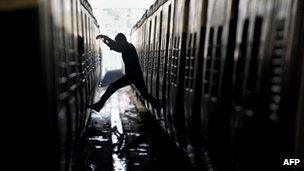
Transport services were heavily hit by the strike in West Bengal
Only a handful of government buses defied the strike call, but they had few passengers. Train services, too, were hit with protesters putting up blockades on railway tracks in various places. Calcutta Metro services, however, ran normally and so did airport operations.
All government employees in the state were ordered to turn up for work - the state secretariat reported attendance of around 90%, Chief Minister Mamata Banerjee claimed.
She withdrew her party's support for the government in protest at its plans, but said she was opposed to Thursday's strike.
There were sporadic incidents of violence in different parts of the state with reports of Ms Banerjee's Trinamool Congress party supporters clashing with pro-strike demonstrators in Calcutta, Howrah and Coochbehar. The strike was supported by the state's main opposition Communist coalition, the Left Front.
Police say more than 650 people were arrested in the state.
YOGITA LIMAYE, MUMBAI
The strike had little discernable impact in India's business hub, with most shops and businesses functioning normally.
But this was only because one of the main political parties in Mumbai - the right-wing Shiv Sena - ordered its supporters not to take part in any industrial action which would interfere with the 10-day Hindu Ganpati festival.
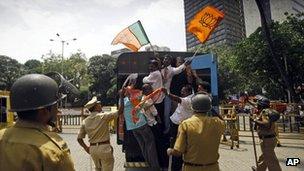
The strike had only a limited impact in India's commercial capital Mumbai
As a result, public transport operated pretty much as normal. However, the roads were much quieter because most lorry drivers - angry over the central government's move to increase diesel prices - stayed off the highways.
There is little doubt that most middle- and lower-class people - suffering from stagnating incomes and higher food and everyday living costs - are overwhelmingly opposed to proposals to increase foreign direct investment (FDI) and raise prices.
But big Mumbai business leaders - including Ratan Tata and Anand Mahindra - have strongly backed the central government, arguing that the measures will provide India's beleaguered economy with a much-needed fillip.
The Maharashtra state government - which like the central government is led by Congress and the Nationalist Congress Party - have been put on the back foot by the strength of feeling against the reforms.
GEETA PANDEY, DELHI
Areas of the capital like Karol Bagh and Chandni Chowk, which are dominated by the main opposition Bharatiya Janata Party (BJP), saw mostly deserted streets and downed shutters with shops and businesses largely shut.
But in other parts of the city, the strike seemed to have had little impact. Most schools and colleges were open and so were private and government offices. For most malls and multiplexes, it was business as usual. In many residential colonies, corner shops - which critics say will be the worst hit by the government's retail reforms - were also open.
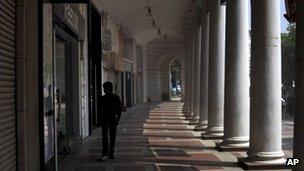
Many shops closed in the capital Delhi
Public transport was affected, with fewer buses and autorickshaws on the streets, but Delhi Metro services operated normally.
Senior BJP leaders, including party president Nitin Gadkari, addressed demonstrations but most gatherings saw small turnouts. Many of the protesters carried placards, saying "go back, Walmart" as they chanted anti-government slogans.
The biggest - and the most dramatic - protest in Delhi was a joint effort by Mulayam Singh Yadav of the Samajwadi Party and Communist leader Sitaram Yechury who led a group of about 2,000 protesters to Parliament Street police station, demanding to be arrested. They were detained briefly and released.
HABIB BEARY, BANGALORE
Nearly 500,000 IT industry employees in Bangalore were off work because of the strike call by the state's ruling Bharatiya Janata Party.
Offices, schools, colleges, commercial establishments all shut down across Karnataka.
Bangalore, where hundreds of tech companies and call centres are headquartered, was deserted. Most companies had declared a holiday, fearing violence if they ignored the strike call, officials said.
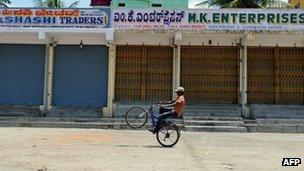
The city of Bangalore, a hub of India's IT industry, was virtually shut down
However, police said the strike was largely peaceful. Several BJP leaders were briefly detained in Bangalore after they tried to march to the governor's office in protest. In Chikmagalur and Hubli, which are considered BJP strongholds, shop owners were forced to close down by protesting party workers.
Hundreds of train and bus passengers were stranded in Bangalore and elsewhere as the state-owned buses stayed off the roads. One passenger, Ramesh, wondered whether the protest would do anything to bring down fuel prices. "These strikes are meant only to make political gains," he said.
This is the second time in less than five months that the IT industry has been hit by a nationwide strike against fuel price rises. The industry estimates business losses of more than 8bn rupees (nearly $150m) a day in Bangalore alone. Karnataka generates 40% of India's annual software exports of $69bn.
OMER FAROOQ, HYDERABAD
In Andhra Pradesh - a state governed by the Congress party but where the opposition remains strong - the strike call had a major impact on normal life. Public transport buses were off the roads and most colleges and schools remained shut. Shops and businesses were also closed. The strike had the support of all the opposition parties.
In Hyderabad, legislators and other leaders of the Telugu Desam and left-wing parties held a demonstration in front of the state assembly. TDP legislators also cooked food on the road using firewood as a mark of protest.
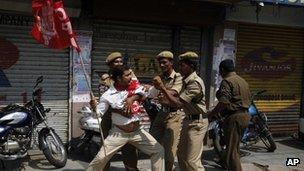
Members of opposition parties protested in the southern city of Hyderabad
Senior BJP and communist leaders were among several hundred people arrested all over the state.
The strike also had an impact on the famous temple town of Tirumala which is holding the annual "Brahmotsavam" celebration. Normally the town is jam-packed during the festival, but the absence of a bus service brought numbers down drastically and there was many fewer devotees.
TN GOPALAN, CHENNAI
The strike call was observed by some in the southern state of Tamil Nadu, but life did not exactly come to a grinding halt.
Most shops and establishments remained closed as small traders are vehemently opposed to the move to open up the retail sector.
Autorickshaws and three-wheelers were also off the road in many places, but otherwise transport was not much affected. The state-owned transport corporations by and large maintained their fleet strength. The state and central government offices functioned normally, as did schools and colleges.
Ironically, the DMK party, a key constituent of India's federal coalition, supported the protest - but the AIADMK party, which is in power in Tamil Nadu, did not. However, the mercurial Chief Minister Jayalalitha has denounced the diesel price rise and also vowed not to allow multinationals to enter the retail trade in the state.
There were no incidents of violence.
RIYAZ MASROOR, SRINAGAR
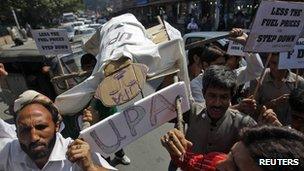
The impact of the strike in Jammu and Kashmir was limited to protests by a few opposition activists
Besides a few token protests by local BJP workers and a handful of Communist Party of India (Marxist) activists, the economically isolated state of Jammu and Kashmir was largely unaffected by the strike.
While Chief Minister Omar Abdullah has supported the government move, the opposition and separatist groups have preferred silence.
There are many reasons for this. One is that the prices of fast moving consumer goods here keep fluctuating. Supporters of the government's supermarket plan say it will ensure stable prices and unhindered supply chains.
Besides, Kashmiris would be happy to see foreign direct investment in the power and tourism sectors. Locals accuse the state-run power producer of "stealing" their water so any move to open up that sector would be seen as a confidence-building measure.
- Published20 September 2012
- Published20 September 2012